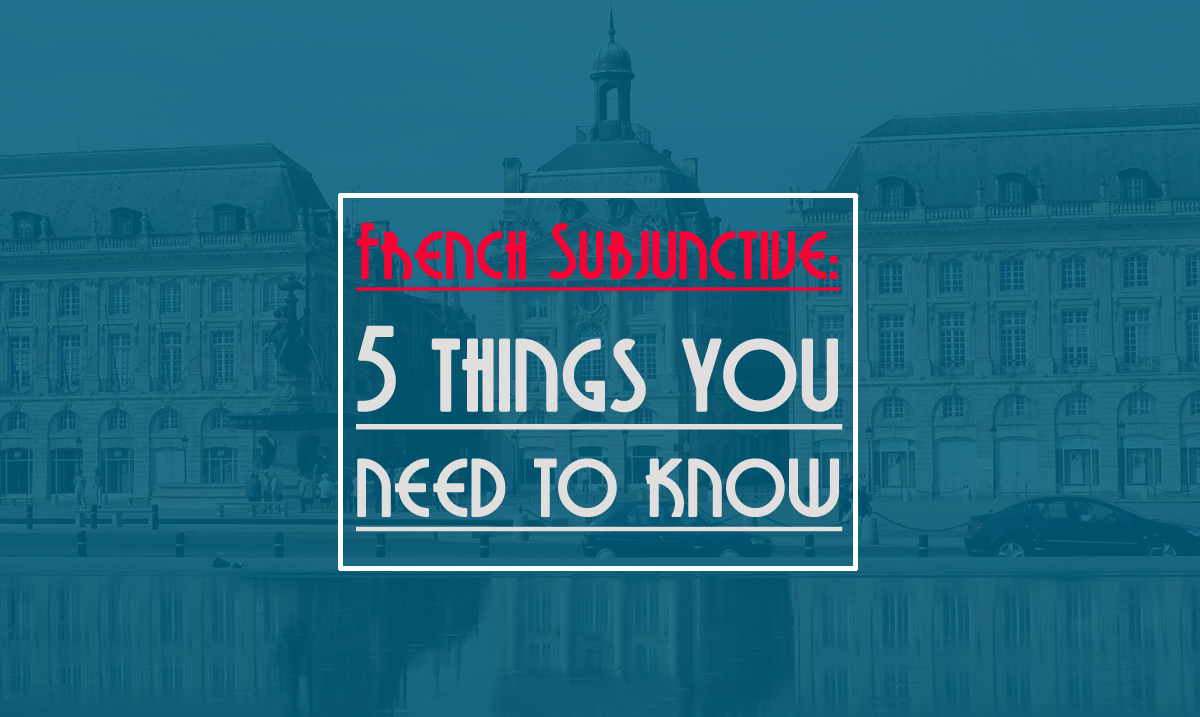French subjunctive? What is it?? I can almost see the question marks hovering around your head right now. But no worries, this article will strive to replace those question marks with a huge light bulb that will make you go...
To make things a lot easier for you, I have listed down five things that you need to know about the French subjunctive.

So here are the 5 must-know things about the subjunctive in French.
1. What exactly is the French subjunctive?
The subjunctive is a grammatical mood which is found in different languages including English and French. When it comes to frequency of usage, however, it is so much more widely used in French than in English.
The subjunctive is used to express varied states of unreality or uncertainty like some kind of judgment, wish, possibility, opinion, doubt, emotion, or something that has not occurred yet.
You need to remember two things when it comes to what the subjunctive means:
If it doesn't fall into either category, you usually make use of the indicative mood.
There is no future tense usage of the subjunctive, only past and present. If it is set to happen in the future, the present tense is being used.
2. The French Subjunctive's English Counterpart
I have mentioned that the English subjunctive is not used as often as in French, but we use it in everyday modern English. This happens when we say “If I were you”, “It is important that you stop to read the signs”, and similar subjective statements.
The subjunctive often appears in subordinate clauses especially that-clauses.
More examples:
Is it really necessary that we stop to read each and every sign?”
He suggested that you continue with your noble path.

Speak, Listen, and Write French like a Native with Talk in French Complete Courses
3. When to use the French subjunctive
In French, we use the subjunctive after certain words and conjunctions that have two parts and two different subjects.
Example: Nous voulons qu'elle soit heureuse. (We want her to be happy).
The first part of the sentence uses nous as the subject, while the second part uses elle. Therefore, the subjunctive soit is necessary.
The subjunctives usually appear after the following verbs:
regretter que (meaning to be sorry that)
être content que (meaning to be pleased that)
être surpris que (meaning to be surprised that)
...and more.
For more details about this particular topic, proceed to this link for the compiled list of verbs and expressions that need to be followed with a subjunctive. You can also read this article about the subjunctive (subjonctif) in French.
The subjunctive may also appear in some expressions that begin with il.
Some examples:
il faut que (it is necessary that)
il vaut mieux que (it is better that)
4. How to form the French subjunctive
For verbs that end with -er, here is how you form the subjunctive:
These are the endings to be added, depending which pronoun it is being used with.
Take note that the endings are basically the same as the present tense endings for nous and vous which are same as the imperfect tense endings and comes with an extra -i-.
For verbs that end with -ir, you form the subjunctive by using this simple formula:
For verbs that end with -re, the subjunctive is formed by following this guide:
Please note that the endings are the same as the endings for the -er verbs:
5. The Irregulars
Unfortunately, in grammar just as in life, there is no way to avoid the irregular, rule-breaking few. And there's nothing else we could do about these but to tolerate them while being wary of them at the same time.
Here are the irregular verbs in the subjunctive.
| Verb | aller | avoir | devoir | dire | être |
| Meaning | to go | to have | to have to, must | to say, to tell | to be |
| Je | aille | aie | doive | dise | sois |
| Tu | ailles | aies | doives | dises | sois |
| Il/Elle/On | aille | ait | doive | dise | soit |
| Nous | allions | ayons | devions | dlsions | soyons |
| Vous | alliez | ayez | deviez | disiez | soyez |
| Ils/Elles | aillent | aient | doivent | disent | soient |
| Verb | faire | pouvoir | prendre | savoir | venir | vouloir |
| Meaning | to do, to make | to be able to, can | to take | to know | to come | to want to |
| Je | fasse | puisse | prenne | sache | vienne | veuille |
| Tu | fasses | puisses | prennes | saches | viennes | veullles |
| Il/Elle/On | fasse | puisse | prenne | sache | vienne | veuille |
| Nous | fassions | puissions | prenions | sachions | venions | voulions |
| Vous | fassiez | puissiez | preniez | sachiez | veniez | vouliez |
| Ils/Elles | fassent | puissent | prennent | sachent | viennent | veuillent |
So with that, we end our lesson in the French subjunctive.
But wait!!!
Before you go, here are a few key points to wrap up our lesson.
Quick Recap
- The subjunctive is used to express varied states of unreality or uncertainty like some kind of judgment, wish, possibility, opinion, doubt, emotion, or something that has not occurred yet.
- The subjunctive appears after certain words and conjunctions that have two parts and two different subjects. It is also found after expressions that start with il.
- The verb stem for the subjunctive is the same as the stem for present tense.
- Verbs that end in -er and -re have the same endings: -e, -es, -e, -ions, -iez, -ent.
- Verbs that end in -ir have the following endings in the subjunctive mood: -isse, -isses, -isse, -issions, -issiez, -issent.
If you need clarifications about this topic, do not hesitate to leave a message in the comments section.

Speak, Listen, and Write French like a Native with Talk in French Complete Courses
Here are some FAQs about Common French Phrases
When do you use the subjunctive in French?
In French, you use the subjunctive when you are wishing for something, fearing something, expressing how you feel, or giving an opinion.
What is the subjunctive in French?
The subjunctive is a grammatical mood used to express various states of unreality or uncertainty, like judgment, wishes, possibility, opinion, doubt, emotion, or something that has yet to happen.
How do you form the subjunctive in French?
Forming subjunctive in French is different for every verb.
How do you use the subjunctive in French?
When two parts of a sentence have different subjects, you will use the subjunctive after certain verbs and conjunctions.






Wonderful post! I always find teaching the subjunctive to be so challenging but rewarding once they get it.
In order to keep it simpler for my students when it comes to formation of the “regulars”, I tell them to take the “ils/elles” form, hack off the “ent” and then add the endings (e, es, e, ions, iez, ent). That way you don’t have to distinguish between ER/IR/RE. It works for all of them.
Yes, you can also do this way.
Thank you. Great resource!
[…] If you are looking to make some phrases with the French Subjunctive, this list below might be useful for you. In case you want to know more about the French Subjunctive, I recommend to read this article here. […]